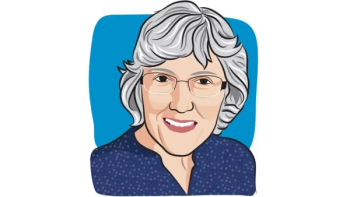
What Every Woman With Ovarian Cancer Should Know
Knowing if a woman's ovarian cancer is genetic could have a huge impact not only on her treatment, but on her family as well.
Although 1 in 5 women diagnosed with ovarian cancer has an inherited mutation or genetic change that caused her cancer, only 30 percent of women have undergone genetic testing. The group Facing Our Risk of Cancer Empowered (FORCE) wants to change that troubling statistic through its new campaign, KNOW MORE.
“Knowing whether your ovarian cancer was caused by a genetic mutation or not can have ramifications not only for your treatment, but for your entire family," stresses Karen Kramer, senior vice president for marketing at FORCE.
Every woman with ovarian cancer meets national guidelines for genetic evaluation, and that alone takes away one huge obstacle, Kramer explains. “Women can go to a genetic counselor or their doctor and say, ‘I’ve had ovarian cancer, and I would like genetic counseling.’ Most insurance companies will cover that cost.”
Yet, notes Kramer, because many women with ovarian cancer don’t know this, they don’t know to ask about it.
Genetic testing can help women with recurrent ovarian cancer learn if they qualify for targeted therapies. It can also help women who are newly diagnosed or facing recurrence to find out if they qualify for a clinical trial. And, women who test positive for certain mutations can consult with their healthcare providers to discuss prophylactic and/or surveillance options to protect themselves from a new diagnosis, for example, breast cancer in women found to have a BRCA mutation.
The purpose of the KNOW MORE project is twofold. First, through a national survey that is currently underway, FORCE wants to learn why more women with ovarian cancer don’t get the genetic testing that national guidelines recommend.
Kramer says FORCE wants to know, “What are the roadblocks and obstacles that keep women from talking about and seeking out genetic evaluation?”
Second, FORCE will use the information gleaned from the survey to refine its multiyear awareness campaign so that it addresses those barriers. Kramer adds that she frequently hears from women who will say they have heard about genetic testing, but erroneously believe, “I didn’t really think it matters to me, because I already have cancer.”
Importantly, arming women with knowledge of genetic factors implicated in their ovarian cancer allows them to share vital health information with their relatives who can then take steps to protect themselves.
This priority aligns with one of the overarching goals of FORCE: “To give people the information they need to remain previvors as opposed to becoming survivors — or at least to become a survivor at the earliest stage possible when cancer is most easily treated,” explains Kramer, herself a previvor.
The response thus far to the KNOW MORE ovarian cancer survivor survey has been very encouraging, notes Kramer, but she hopes more people will complete the survey and share the opportunity to participate with friends or family. The survey is open to any woman diagnosed with ovarian, fallopian tube or primary peritoneal cancer, regardless of whether or not they have had genetic counseling or testing, and can be accessed



